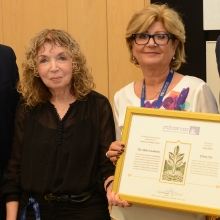Jeremy Wertheimer
Q&A

Jeremy Wertheimer of Brookline, Massachusetts, was recognized at the International Board for his generous gift establishing the Wertheimer Center for Computational Biology.
The Center will enable the integration of big data into a wide array of biological research projects, including advancing precision medicine, working hand-in-hand with experts at the Nancy and Stephen Grand Israel National Center for Personalized Medicine.
Dr. Wertheimer (pictured with Prof. Daniel Zajfman) is a computer scientist who co-founded ITA Software in 1996 with colleagues from MIT, with the aim of enabling airlines and travelers to find the best airline fares. He developed the idea while completing his PhD in artificial intelligence at MIT, also in 1996. The 400-person company’s software was first used by Orbitz in 2001, followed by a long list of airlines including American Airlines, United Airlines and Delta Air Lines. In 2011, Google acquired the company and shortly thereafter launched Google Flight Search. Dr. Wertheimer is now a Vice President of Engineering at Google. He is a trustee of Cooper Union, and serves on several other boards.
Q What was the origin of your idea behind ITA?
A I was initially surprised by how difficult it was to find the best airline fares when booking a ticket. I realized that the software that the industry used had been written in the 1960s for the needs of a regulated industry and with the constraints of running on mainframe computers, neither of which were now appropriate. Perhaps it was a bit of hutzpah to think that we could transform the industry, but we were trained computer scientists and this was a computational challenge. And in the end we did transform the industry.
The core part of the problem is finding the right information for the individual situation - similar to the situation with health data. And sometimes, bringing together two separate fields or industries that didn’t communicate much in the past can be very successful. That thought first occurred to me when I went to a computer conference in 1993 attended by people from the airline industry but not by people from the computer science research community. And that also applies in the case of fusing computational tools with biology.
Q Why did you establish the Wertheimer Center?
A The scale of the data that we have at our fingertips now is breathtaking. We are becoming better and better at gathering data and at analyzing it with sophisticated algorithms and other computational tools. I think there is great potential in bringing computational tools and techniques into the world of biology. I believe it will make a difference in the study of cancer and many other diseases, and in ways that we have not yet imagined.
Q Why is the Weizmann Institute the place to do this?
A Weizmann has identified the great potential of big data and its scientists are integrating it into their work with the knowledge that large data sets and computational tools can advance biomedical research. I hope that we can create an entrepreneurship ecosystem where we can bring the benefits of computational biology to the world.








